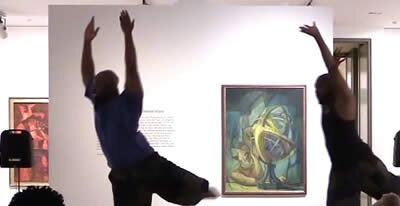
Allyson Purpura, Curator Krannert Art Museum
On October 9, Krannert Art Museum hosted its second Global Africa Community Forum. Held in KAM’s Gelvin Noel Gallery, the year’s Forum explored the many-layered experiences of blackness, masculinity, and coming of age. Directed by dancer-choreographer C. Kemal Nance, Lecturer in Dance at UIUC, the event featured a suite of three interconnected performances involving dance, voice, and personal testimonials from audience members who had rehearsed earlier with Nance. Dancers included Djibril Camara, master dancer and choreographer at UIUC who performed, in silence, the dununba, a competitive men’s dance associated with age group hierarchies in upper Guinea; Nyama McCarthy Brown from Indiana University, who performed with her 2-year old son; and Stafford Berry Jr., from Denison University, who joined Nance in an intimate duet of dance and spoken word.

Photo by Angie Pittman and Justin Yeung, 2014: C. Kemal Nance and Stafford Berry Jr. performing in the Gelvin Noel Gallery, Krannert Art Museum.
Nance is the first male master teacher of Umfundalai, a contemporary African dance technique created by acclaimed choreographer Kariamu Welsh, and is director of Berry & Nance Dance Project, an all-male African dance initiative. On the Forum event Nance reflects, “The dance Stafford and I performed was auto-ethnographical—the words and movements chronicle our collective experiences as African American men from Chester, Pennsylvania and the synchronization of those experiences as we celebrate almost thirty years of friendship. As a performer, it was empowering—sometimes sadly so—to discover that our stories of struggle connected so deeply with the stories of other Black men whom we only met through the coordination of this Forum.” Indeed, many of the “coming of age” testimonials Nance heard during rehearsals were marked by racism and threats of violence. These injustices—and their impact on Black masculine agency—wove through much of the Q&A discussion that followed. Erik McDuffie, associate professor of African American studies who moderated the discussion, added that homophobia—with its damaging rejection of non-normative expressions of masculinity—still needs to be confronted head on, particularly within Black communities. In yet another strand of conversation, Forum co-organizer Anne Lutomia, a PhD candidate in the department of education who is from western Kenya, shared her thoughts on “coming of age” in contemporary Luhya society, and how the privileges bestowed upon circumcised males rippled throughout the entire community, formalizing gender inequalities, and transforming boys into men “who do not cry.”
KAM’s Global Africa Community Forum is designed to transform the museum space into a dynamic and participatory public forum for engaging issues relating to the arts, cultures, and communities of Africa and the African diaspora. The evening’s dance performances, testimonials, and impassioned conversation with the audience revealed the truly unique power of the arts to open up new ways of engaging the urgent social issues of our time.
The event was organized by the Global Africa Community Forum working group, which includes Erik McDuffie, Anne Lutomia, Sam Smith (engagement director, KCPA), Anne Sautman (KAM director of education), Mabinty Tarawallie (MSW, alumna of the School of Social Work), Rory James (director of the Bruce D. Nesbitt Center for African American Culture), and Allyson Purpura (KAM curator of African art).